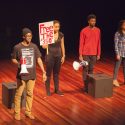Educators to learn about using hip hop, spoken word as classroom tools
More than 40 educators from nine states will attend the fourth annual Hip Hop and Spoken Word Teacher/Educator Institute on campus July 6-10.
Each summer the Office of Multicultural Initiatives (OMAI) teams with Urban Word NYC to offer this weeklong program for teachers, educators, community leaders and education students to learn the best practices in hip-hop and spoken word pedagogy.
Both hip hop and spoken word are gaining wide recognition as legitimate teaching tools, says OMAI Arts in Education director Katrina Flores.
“The Hip Hop and Spoken Word Community Educator and Teacher Training Institute is an incredibly important component to culturally relevant pedagogy development,” Flores says. The institute provides community educators and teachers the opportunity to see into and experience the lives of their students through youth culture.”
Teachers who have attended the institute agree that spoken word and hip hop provide new opportunities to formulate lessons and engage students.
“I’m developing a unit on corporations for an economics class using critical engagement of hip hop songs and research into corporate activity and accountability,” says Casandra Tanenbaum, a 2008 institute participant. “Additionally, I have a stronger grasp on the potential for teaching hip hop as inspiration for writing.”
Educators across the country are following UW–Madison’s OMAI program and the emerging pedagogy as the art forms evolve and are studied by disciplines from linguistics to cultural anthropology.
“[Hip hop] addresses the flaws in our educational system that insist that the educational system is not flawed; it provides outlets and relevancy for the more marginalized student and awareness for those who unconsciously identify themselves in the ‘norm,’” says Mary Swenson, a high school teacher from Madison. In fact, structure of the institute itself is a learning experience, she adds.
“The balance of instructors/speakers — each day brought about a new approach to content and pedagogy. Excellent balance with practical outcomes in the classroom,” Swenson says. “Each instructor modeled his/her strategies, which proved much more valuable than lecturing about varying techniques.”
Winner of the 2007 North American Association of Summer Sessions “Creative and Innovative Program Award,” this institute brings together the leading educators, professors, emcees and activists who use the media of spoken word and hip-hop as relevant, dynamic and necessary educational tools to engage students across multidisciplinary curricula.
This year marks the program’s fourth year. It has grown with additional support from professors Carl Grant and Paula Wolfe of the UW–Madison School of Education’s curriculum and instruction program.
“Last year was an important year as we reached nearly 40 teachers and community educators from across the country,” Flores says.
The institute also serves to build a national network of teachers and community educators working in tandem to build capacities and strategies for improving the lives of our youth in educational and community program settings through spoken word and hip hop, she says.
“I don’t think it is something that can be defined,” says Shannon Sandrea, a community center director from Austin, Texas. “I think it means something a little different to each person. It is more than music, dance, etc. It is a cultural uprising and movement that is “living” (never static). I believe it is a support system that unifies youth culture.” OMAI and First Wave have served UW–Madison by expanding the cultural and artistic possibilities of UW–Madison students and the campus community, Flores adds.
“In turn, this institute is the dynamic synthesis of what happens when youth culture becomes our guiding core in producing educational tools and practices that flow directly from the art form itself.”


